New Reports
“Business as usual is not an option” was the key message of the International Assessment of Agricultural Knowledge, Science and Technology for Development (IAASTD), which called for a paradigm change in agriculture. Although some of its findings sounded revolutionary when it was first published in 2009, they have since become mainstream, despite the fact that concrete proposals on how to achieve sustainable food and agriculture systems continue to diverge. Below is a collection of publications that resume the discussion on the main topics initiated by the IAASTD.
UNCTAD Trade and Environment Report 2013: Wake up before it is too late
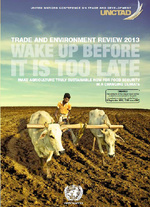
A United Nations Conference on Trade and Development (UNCTAD) report published on September 18th calls for radical changes in agriculture and food production. Farming in rich and poor nations alike should shift from monoculture towards greater varieties of crops, reduced use of fertilizers and other inputs, greater support for small-scale farmers, and more locally focused production and consumption of food, the report recommends. The UN Trade and Environment Report 2013 warns that continuing rural poverty, persistent hunger around the world, growing populations, and mounting environmental concerns must be treated as a collective crisis. It says that urgent and far-reaching action is needed before climate change begins to cause major disruptions to agriculture, especially in developing countries. Almost 1 billion people currently suffer from hunger, and another 1 billion are malnourished, the report notes, even though current global agricultural production already provides sufficient calories to feed a population of 12 to 14 billion. Highest priority must be given to enabling the rural poor to become self-sufficient in food or to earn sufficient income through agriculture so that they can buy food. Download the report here
The UNEP Green Economy Report
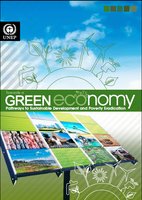
November 2011. In its Green Economy Report, the United Nations Environment Programme (UNEP) outlines a transition towards a low carbon, resource-efficient global economy. The report is intended to serve as a basis for the United Nations Conference on Sustainable Development (Rio+20). The main message is that greening the economy would lead to increased growth in economic terms and generate jobs, thus reducing poverty. According to the report investing just 2% of global GDP into ecological measures by 2050, including US$ 100-300 billion per year in green agriculture, could keep the atmospheric concentration of emissions below 450 ppm. It would also guarantee the availability of sufficient natural resources for a world population of 9 billion people. The first chapter of the report, which was coordinated by the IAASTD’s co-chair Hans Herren, is dedicated to the transition towards green agriculture. It repeats the main messages of the IAASTD and elaborates on some of these further.
Download the full report or the first chapter on agriculture.
Deutsche Bank Research Reports on Mitigating Climate Change through Agriculture and Rising Food Prices

October 2011. Deutsche Bank Research published two reports. The first focuses on the link between climate change and agriculture, the second on the increase in food prices. The research paper Mitigating Climate Change through Agriculture: An Untapped Potential estimates that agriculture, together with forestry, has the potential to mitigate climate change through an 18% reduction of total emissions. Climate-friendly agricultural practices, a shift towards climate-conscious consumption and reform of agricultural policies are all needed to fully unlock this potential.
The second report Where are Food Prices Heading? Short-term Drivers, Trends and Implications arrives at the conclusion that rising food prices pose a threat to food security, particularly for people in low-income countries. The report mainly attributes high food prices to supply and demand trends. It considers the role of speculation to be unclear¹, but admits that it can potentially amplify price spikes.
¹ With respect to this question, the reports arrives at entirely different conclusions to those reached in the report How Deutsche Bank, Goldman Sachs and other Financial Institutions are Speculating with Food at the Expense of the Poorest, which was published at the same time by Foodwatch.
Save and Grow: A Policymaker’s Guide to the Sustainable Intensification of Smallholder Crop Production
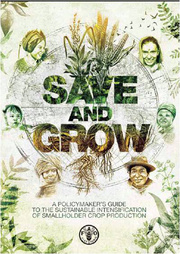
June 2011. The Food and Agriculture Organisation (FAO) published Save and Grow: A Policymaker’s Guide to the Sustainable Intensification of Smallholder Crop Production. The report presents a new paradigm called 'Sustainable Crop Production Intensification' (SCPI). The message of the publication is that “The present paradigm of intensive crop production cannot meet the challenges of the new millennium. In order to grow, agriculture must learn to save”. The challenge, especially in developing countries, is to produce greater yields from the same area of land whilst conserving resources and reducing negative impacts on the environment. SCPI is an attempt to find a compromise between conventional and sustainable agriculture. It can be seen as an attempt to outline the transition from industrial fossil-based agriculture and methods of the “Green Revolution”, towards agroecological principles and cultivation systems which place small-scale farmers at centre stage. It could also be interpreted as an approach to greenwash industrial intensification in agriculture.
The Great Green Technological Transformation

April 2011. The Department of Economic and Social Affairs of the United Nations Secretariat completed the World Economic and Social Survey 2011 entitled The Great Green Technological Transformation. At the core of this great transformation is a comprehensive global energy transition and a reduction in the consumption of resources within a short time. The third chapter on agriculture suggests a “truly green revolution for food security”, which is closely based on the IAASTD’S recommendations for agroecology. According to the survey, new and old technologies exist that are known to ensure more sustainable farming and forestry management, but a great deal more innovation and knowledge sharing is needed to allow for their adaptation to local conditions. What is missing is the will to take action and widely distribute these technologies. The main author of the report and Under-Secretary-General of the Department of Economic and Social Affairs is also serving as Secretary-General of the 2012 UN Conference on Sustainable Development (Rio+20).
Sustainable Food Consumption and Production in a Resource-constrained World
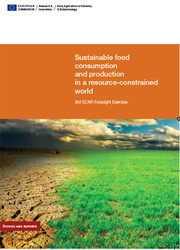
February 2011. The European Union’s Standing Committee on Agricultural Research (SCAR) published its foresight report Sustainable Food Consumption and Production in a Resource-constrained World. Some of its programmatic conclusions go clearly beyond the IAASTD’s wording. The report calls for a paradigm shift from the dominant “productivity narrative” towards the “sufficiency narrative” to provide a more advantageous guiding narrative for future agriculture. The world food system is threatened by a complex mix of “scarcities”, including biophysical limits such as resource supply, and environmental limits such as pollution, as well as scarcities related to technological or social perspectives. Each of these scarcities could lead to conflict. Due to the interconnectedness of the combined scarcity challenges and the limited understanding of the feedback loops, science remains ill-prepared to deal with these challenges, and the future remains uncertain. The time needed to realise such a transition is also a scarce resource. The report recommends investment in farming systems “that take account of the interactions between productivity, environmental, economic and social sustainability goals”. These systems have to become more robust and resilient to ecological and economic crises. In order to achieve sustainable agriculture a “radical transformation of agricultural and food systems and of the knowledge and innovation system supporting them” is needed. The report is a slap in the face for the existing European Common Agricultural Policy (CAP) and the focus of its research. In May, it was officially presented at a conference in Budapest. Here you can find the authors' presentation along with other speeches that were given.
The Top 100 Questions of Importance to the Future of Global Agriculture
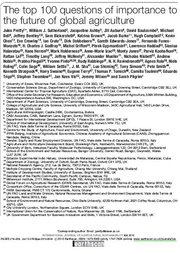
January 2011. Questions determine the answers that are given. 55 leading agricultural scientists and nutritionists from 23 countries and leading institutions published a list of The Top 100 Questions of Importance to the Future of Global Agriculture. Over the course of a year, under the direction of Professor Jules Pretty, scientists worked on this paper and bargained over the questions. The aim was to use scientific evidence to lead policymakers to consider the future direction of agricultural research priorities and policy support. The result can also be interpreted as an attempt to pave the way for consensus within the scientific community on the fact that a paradigm change is inevitable. The majority of the authors can also be found in The Future of Food and Farming.
State of the World 2011: Innovations that Nourish the Planet
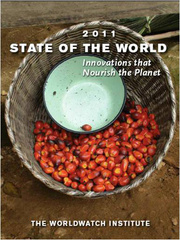
January 2011. The Worldwatch Institute published the State of the World 2011: Innovations that Nourish the Planet. It presents an overview of hundreds of simple and effective solutions to improve the food situation, as well as the efficiency and ecological adaptation of agriculture, particularly in developing countries. The State of the World report affirms agroecological knowledge as a solution that must be incorporated into government policies. It echoes the IAASTD’s proposals and speaks of local plant varieties and vertical gardens in slums; rain harvesting and the breeding of vegetables; the importance of trees and tricks to avoid harvest losses; farmer-led innovation in research and development; the power of women and innovation at community level. The report makes an illustrative and inspiring inventory. Ironically, the field studies were financed by the Bill and Melinda Gates Foundation.
Only excerpts of the report are available for free, for example the articles Moving Ecoagriculture into the Mainstream and Charting a New Path to Eliminating Hunger. The Worldwatch blog Nourishing the Planet continues the debate on the topic.
The Future of Food and Farming
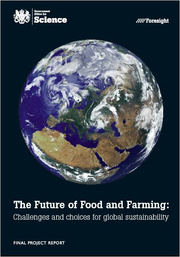
January 2011. The UK Government Office for Science compiled the report The Future of Food and Farming. It offers a comprehensive and concise analysis of the current situation in the global food system and the foreseeable challenges it will face up to 2050, including an increasing demand for food, climate change, biodiversity loss and volatile food prices on the globalised markets. “Any one of these pressures would present substantial challenges to food security; together they constitute a major threat that requires a strategic reappraisal of how the world is fed” write the authors, which include leading opinion-makers from the international scientific community. They are regarded as the inventors of the term “sustainable intensification of agriculture”, which refers to an increase in production while drastically reducing the consumption of resources. The political recommendations of the report do not measure up to the quality of the analysis. However, despite the common preference for high-tech solutions and global free market economy, the report sees the future of food and agriculture primarily in the reduction of over-consumption. The future lies in changed consumption patterns, small but productive transformations at the local level, the knowledge of small-scale farmers and a substantial investment in agroecology. In 2009, a fairly similar group of scientists compiled the report Reaping the Benefits: Science and the Sustainable Intensification of Global Agriculture for the Royal Society, which could be described as a counter-report to the IAASTD, focusing heavily on the promises of new technologies. In this light, The Future of Food and Farming can be seen as the mainstream scientific community's first step in abandoning the paradigms of the past century.

